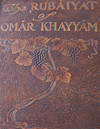
Rubaiyat of Omar Khayyam, the Hardcover -
by Fitzgerald, Edward
- Used
- very good
- Hardcover
Description
NZ$1,375.94
NZ$6.67
Shipping to USA
Standard delivery: 7 to 14 days
More Shipping Options
Standard delivery: 7 to 14 days
Ships from BohemianBookworm (New Jersey, United States)
Details
- Title Rubaiyat of Omar Khayyam, the
- Author Fitzgerald, Edward
- Binding Hardcover
- Condition Used - Very Good
- Bookseller's Inventory # 94802
About BohemianBookworm New Jersey, United States
Biblio member since 2013
Since 1991 BOHEMIAN BOOKWORM has been pleased to sell rare, vintage, antiquarian and distinctive used books to discriminating bibliophiles and other book and ephemera buyers searching for uncommon 1st editions and "out of print" gently used books and ephemera.
30 day return guarantee, with full refund including original shipping costs for up to 30 days after delivery if an item arrives misdescribed.
About this book
he Moving Finger writes; and, having writ Moves on: nor all thy Piety nor Wit Shall lure it back to cancel half a line Nor all thy tears wash out a word of it.' In the 'rubaiyat' (short epigrammatic poems) of the medieval Persian poet, mathematician, and philosopher Omar Khayyam, Edward Fitzgerald saw an unflinching challenge to the illusions and consolations of mankind in every age. His version of Omar is neither a translation nor an independent poem; sceptical of divine providence and insistent on the pleasure of the passing moment, its 'Orientalism' offers FitzGerald a powerful and distinctive voice, in whose accents a whole Victorian generation comes to life. Although the poem's vision is bleak, it is conveyed in some of the most beautiful and haunting images in English poetry - and some of the sharpest- edged. The poem sold no copies at all on its first appearance in 1859, yet when it was 'discovered' two years later its first admirers included Dante Gabriel Rossetti, Swinburne, and Ruskin. Daniel Karlin's richly annotated edition does justice to the scope and complexity of FitzGerald's lyrical meditation on 'human death and fate'.
